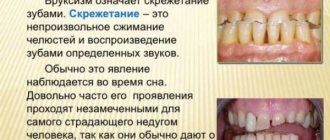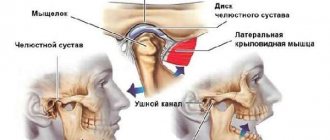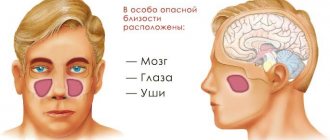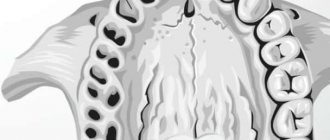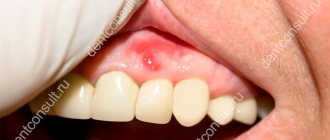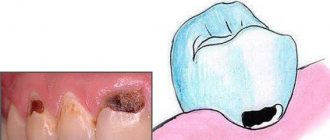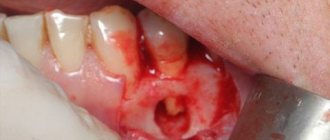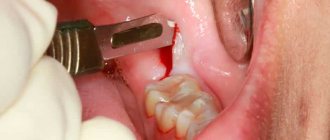The main causes of acute toothache
In the early stages of tooth decay, the pain is insignificant and even almost unnoticeable, most often caused by cold or hot food and drinks, as well as sour or sweet foods. When caries is deeper, pain occurs every time you eat and brush your teeth.
Thinning tooth enamel
Thinning tooth enamel or cracks in it contribute to increased tooth sensitivity. Teeth hurt severely but for a short time from any irritant (temperature, air, sour things, sometimes even touching a hypersensitive area is unbearable).
When the pulp (the soft tissue of the tooth with the nerve located in it) is inflamed, pain can occur spontaneously (usually at night) and radiate to the temple or ear, to neighboring teeth. It also subsides spontaneously. In acute pulpitis, there is an alternation of “painful” and “quiet” intervals. Cold and hot things cause acute pain, which does not go away immediately after the irritant is removed, but gradually calms down. In some forms, cold soothes pain.
Periodontitis
Periodontitis is an inflammation of the tissues surrounding the apex of the tooth. The pain is aching, bursting, and intensifies when you touch the tooth or gum. May be accompanied by inflammation of the gums and loosening of the tooth. In certain forms, a fistula with purulent discharge forms on the gum.
Periodontitis
Periodontitis is an inflammation of the periodontal soft and hard tissues, the ligamentous apparatus of the tooth. Characterized by constant aching or throbbing pain in the area of the causative teeth and gums around them, which intensifies when biting. Usually accompanied by mobility of teeth and bleeding gums.
Pericoronitis
Pericoronitis is an inflammation of the soft tissues surrounding the wisdom tooth due to its difficult eruption. At the same time, aching pain in the area of the erupting tooth is disturbing, intensifying during meals. The surrounding mucosa is swollen and red. The pain may throb. In complicated cases, it is painful and difficult for the patient to open his mouth and swallow saliva.
When walking it feels like it's in the tooth, what is it?
Toothache is a widespread symptom that is familiar to every person. Sometimes the pain when walking radiates to the tooth. This causes trouble in the form of deterioration of both physical and moral condition. Performance decreases, mood disappears, sleep is disturbed, appetite worsens or disappears completely.
Why can pain radiate to the tooth when you walk along the road or while jogging? List of probable causes:
- Caries is a disease in which tooth tissue is destroyed. Occurs in 93% of people. It is influenced by genetic predisposition, nutrition with an emphasis on carbohydrates and bacteria.
- With pulpitis, the internal tissues of the tooth become inflamed. This pathology develops as a result of caries, which penetrates deeper than the enamel into the pulp and is particularly sensitive to external influences. Pain occurs at any time of the day.
- Inflammation of the paranasal sinuses. The most famous is sinusitis; it occurs after a runny nose, viral diseases, or as a result of injury and causes pain, disruption of well-being and thermoregulation.
- Periodontitis is an inflammation of the collection of tissues that surround and hold the tooth in the alveolus. It is widespread among dental diseases. The causes are microorganisms and trauma.
- Pain in the tooth may radiate when walking due to injury. Traumatic damage can affect the tooth directly or be combined with injuries to the jaw and skull. Occurs when falling, fighting, or playing sports.
- Tumors of the jaw cause pain, which may be associated with the dental systems or depend on the bones of the skull. Neoplasms can be benign or malignant.
Caries begins as a dark spot on the tooth and occurs without obvious symptoms. Then a visible cavity appears, and increased sensitivity to the temperature of food or its acidity appears. In the absence of necessary treatment actions, this cavity deepens and turns into pulpitis.
With caries, the tooth hurts when exposed to heat, cold, or sour food and is felt when walking or running. In the absence of irritation, the discomfort goes away. With pulpitis, the tooth does not stop aching even after the irritant is removed. A special feature is the frequency of pain, occurring at night or when moving. With purulent pulpitis, cold helps reduce pain. Usually such pain is difficult to endure, and it worsens when walking and running.
With periodontitis, gums bleed, teeth become loose, plaque and bad breath appear, and saliva becomes viscous. The consequence of the disease is the inevitable loss of the diseased tooth.
Traumatic damage can be a tooth crack, tissue bruise, root fracture, most often this happens to the front incisors. The pain radiating into the tooth is a constant aching character, intensifies when pressed and accompanies the patient when walking or jogging.
The jaw tumor is visible visually and increases over time. In addition to the pain, there is an increase in temperature, nasal discharge, decreased performance, general fatigue; when walking, every step gives pain in the jaw.
In order to prescribe adequate treatment, a specialist must conduct a standard diagnostic examination of the patient and exclude the possibility of toothache due to a number of related diseases.
Mandatory list of procedures:
- examination by a dentist, a special mirror and probe will allow you to find defects in teeth eaten away by caries;
- cold test shows hypersensitivity;
- X-ray examination checks the structure of the tooth from the inside;
- radiovisiography is a type of modern radiography with a lower radiation dose to the human body;
- The caries detector will help identify caries, since it colors the diseased areas, and the photopolymerizer also illuminates the incipient caries;
- examination by an otolaryngologist and other specialists to exclude tumor changes in the jaw using computed tomography of the maxillary part of the skull;
- sinus puncture eliminates the possibility of sinusitis.
For the necessary treatment, you must contact qualified specialists who can correctly and quickly differentiate the diagnosis and prescribe medications, determining the disease, its stage and severity, the presence of complications and the general condition of the patient’s body.
Caries is treated in the dental chair by demineralization and filling. When treating pulpitis, partial or complete removal of the pulp is used, calcium-containing pads and antibiotic bandages are applied, and after treatment the tooth is filled. Treatment of periodontitis is exclusively surgical, with the aim of removing the pathological process from the oral cavity.
In case of traumatic injuries, the doctor decides in a particular case to remove the diseased tooth or install a pin. If the lower jaw is damaged, a fixing bandage is required; the help of a traumatologist may be required to correct the dislocation of the jaw, the pain of which intensifies while walking.
For tumors, surgical treatment is indicated, removing pathogenic tissues, along with adjacent teeth. The malignant nature of the tumor requires an additional combination of chemotherapy and radiation therapy. The outcome of such treatment is negative; a low percentage of operated people survive.
Any pain causes some discomfort and spoils a person’s life with its presence, especially if the tooth hurts while walking. A great many diseases are easier to prevent than to cure. Preventive measures for diseases associated with tooth pain that worsens when walking or running:
- adequate daily hygiene care;
- healthy eating and sleeping patterns;
- reducing the consumption of carbohydrates and keeping them in the mouth for as short a time as possible;
- using special toothpaste containing fluoride;
- brushing teeth using the correct technology;
- frequent mouth rinsing with antiseptic agents;
- examination by a dentist at least once a year;
- timely treatment of carious cavities;
- to reduce the occurrence of accidental injuries, calm, careful behavior, teaching children this;
- in sports - special equipment and ammunition.
If you follow these simple and obvious rules, you can achieve excellent results and avoid pain that radiates to the tooth when walking.
The most effective advice when a tooth hurts is to seek help from a specialized institution and follow all recommendations for treatment and prevention.
Ways to soothe toothache yourself
- Carefully remove all food debris from the interdental spaces and from the cavity in the tooth, and subsequently maintain it in a clean condition.
- Rinse your mouth with a warm solution of soda (1 teaspoon per glass of water), iodinol (diluted with water in a ratio of approximately 1:10), warm infusions of St. John's wort, chamomile, mint, eucalyptus, sage. To prepare infusions, pour one tablespoon of dry herbal raw materials with one glass of boiling water and cool to just above room temperature.
- Suck on a piece of ice (if this does not increase the pain). You can apply ice to the cheek in the area of the sore tooth through a towel for 15 minutes, at least 3 or 4 times a day.
- Take painkiller medicine.
The choice is quite wide. These are drugs based on nimesulide (Nimesulide, Actasulide, Sigan, Kokstral, Nimesil, Nise, Aponil, Aulin, Auronim), ibuprofen (Ibuprofen, Bolinet, Bonifen, Ibalgin, Ibufen, Nurofen, Faspik), metamizole sodium (Analgin, Baralgin), ketorolac (Ketorolac, Adolor, Dolomin, Ketanov, Ketolak, Ketorol, Nato, Toradol, Torolac).
Even aspirin may help, although it is not the best choice. And under no circumstances should you apply the tablet to the gum, as is sometimes advised, otherwise you can burn the mucous membrane. Aspirin is taken only internally!
Be sure to read the instructions for the medicine before use and familiarize yourself with the contraindications! The most common include peptic ulcer of various parts of the gastrointestinal tract, severe dysfunction of the liver and kidneys, high blood pressure, heart failure, pregnancy and breastfeeding.
Taking painkillers must be stopped no later than 3 hours before your visit to the doctor, because this can distort the picture of the disease and make diagnosis difficult.
Taking painkillers significantly reduces the effectiveness of anesthesia during treatment!
Acupressure. It is carried out using the lobes of the thumb and index finger, with sufficient force until slight pain occurs at the site of exposure.
The analgesic effect is achieved by influencing the following points:
- A point in the V-shaped depression between the phalanges of the thumb and index finger.
- A point at the base of the earlobe on the side opposite to the diseased tooth. It should be held between the thumb and forefinger.
- A point in the depression between the lower jaw and cheekbone. Pressing it with your thumb can relieve pain in the teeth of the upper jaw.
- Point on the angle of the lower jaw. Her massage helps relieve pain in the lower teeth.
- A point located on the edge of the index finger (thumb side) 2-3 mm below the base of the nail.
- Do not chew on the affected side.
- Keep your mouth closed if the flow of air over the sore tooth increases the pain.
- It is important not to apply any warm compresses or lotions - this procedure can significantly worsen the situation and complicate further treatment.
- It is strictly forbidden to take antibiotics without qualified consultation and a doctor’s prescription. In general, taking antibiotics for any disease is a very responsible procedure. These drugs are taken according to a special regimen. Taking one pill “just in case” will bring nothing but harm.
This is all you can do before visiting the dentist. And don’t be afraid of the on-call clinic, because in most cases you can relieve acute symptoms without removing the tooth or putting a permanent filling.
And most importantly, do not suffer for a long time and do not “seize” your toothache with painkillers! Thus, you can provoke serious complications and harm your health. And treatment will become more difficult, longer and more expensive over time.
Be healthy!
The information was prepared by dentist Smirnov E.S.
Bursting and throbbing pain in the tooth after root canal treatment.
2 months ago, the nerve was removed from the 5th tooth from above (on the left), chemical treatment was placed. filling, the pain when biting (pressing) went away. The bursting pulsation bothers me, I want to pick something out (remove it from the tooth). After 2 months I went to a paid dentist, took a picture, the doctor said that the canals were perfectly treated.
As a result, the old filling was removed, a photo filling was installed, with relief, the bite is perfect, the tooth is intact. But the pulsation or swelling remained (the doctor said that it was because of the food, they say the food gets stuck between the teeth, but at the moment all the holes are sealed and nothing can get stuck anywhere).
Question for you, dear dentists: what could be the reason for this swelling? This affects my brain and my nervous system, I want to get rid of it, so that there is lightness both below and above (to the right), as before.
Your doctor is wrong, the bursting pain indicates a progressive inflammatory process, and the reason is precisely in the treatment of the canals.
Post here an X-ray image of the root canals, and I will tell you everything.
Contact phone number
TOOTH PAIN IN THE HEART
As an advertisement
Several years ago, various sources said that the cause of jealousy is the feeling of possessiveness experienced by one spouse towards the other. In principle, this is true, but this is a somewhat simplified version. In fact, marital jealousy occurs where one spouse has power over the other—or at least the perception of such power. But this is still not quite a sense of ownership. Jealousy is the fear of losing power.
There is an opinion that jealousy is a kind of “shadow” of love: they say, if you are not jealous, it means you do not love. However, jealousy has nothing to do with love: love is a positive feeling, aimed at creation, at the continuation of life, and jealousy is a destructive feeling, causing harm, not only to the object of jealousy, but sometimes to the jealous person himself.
Animal psychologists once performed such an experiment. They took a troop of monkeys living in a separate enclosure, in which the same relationships and hierarchy are preserved as in a troop living in the wild. In this enclosure there was a leader - the oldest, strongest male, to whom the rest of the young males and females with their cubs obeyed. Moreover, the mandatory qualities of such a leader are strength and justice. His main responsibility is to take care of the pack members, their safety and other aspects of their physical existence. What this leader does: protects his subordinates, divides food among them, stands up for the weak and punishes the disobedient. And thanks to such “reasonable leadership,” the flock exists without unnecessary problems.
So, in the territory of the enclosure, where such a peaceful monkey society existed, the experimenters placed an alien male of the same species, and no less strong. The stranger was fenced off by a transparent but strong wall that did not let in any sounds or smells. So contact with the uninvited guest was excluded. And when the leader saw that a competitor had invaded his territory, a real disaster began.
The monkey boss literally went crazy. He began to behave absolutely destructively: he destroyed and broke everything around him. On the territory of the enclosure, all the bushes and young trees were broken, all the stones were scattered, all the fence posts were torn out. The leader provoked clashes with subordinate males, chased away females - and the most beloved ones got the most - scattered the cubs that fell under the hot hand. In general, he behaved in such a way that, if this were not in a zoo, but in the wild, he would have destroyed the entire flock. Some of the monkeys would have suffered from his unmotivated aggression. and the rest would simply run away from such a leader and die alone. And the leader himself, left alone, would not have survived either. But in captivity, such a leader, in a sense, harmed himself. After all, even if the flock cannot run away from him - the fence is in the way - then after he comes to his senses, they are unlikely to obey him in the same way as before. After all, the leader, let me remind you, must be strong and fair. He showed his strength, but hardly justice. And of course, he completely discredited himself as a wise leader and protector of the pack. Instead of protecting his subordinates, he simply half maimed them, half destroyed them. And the rest of the members of this tribe are unlikely to want to see him at the head of their society...
The essence of the experiment is that the leader experiences real jealousy, or rather, the fear of losing power in his own pack, losing it to a competitor who is clearly no less powerful. Of course, he will not immediately begin to scatter everything - first he will try to sort things out with the stranger directly, but, firstly, the stranger is protected by a strong cage, and, secondly, an experienced leader cannot help but see that his opponent is stronger. And it is still unknown how the fight might end. This means that he has only one thing left to do - show his strength, behave as intimidatingly as possible. Then he may scare the uninvited guest, and he will not claim power in his pack. The fact that the opponent, in principle, cannot enter his territory - the cage is in the way - does not reach the distraught leader. He, feeling a threat to his status as a boss, begins to demonstrate his strength in such inadequate ways. And he strives not only to scare his rival, but also to remind his subordinates who is really the boss here, so that they don’t decide to defect to a new male. That’s why beloved females get more, so that they don’t go over to the rival’s side in the first place.
Of course, from the outside, the spectacle is quite funny - a literally brutal leader rushes around the enclosure, screams, makes noise, beats his chest, makes scary faces... This is one of the most obvious manifestations of jealousy - the fear of losing his power. To be honest, a person driven by such emotions and feelings of jealousy is not far from this monkey lord. And sometimes this person causes himself and others exactly the same harm as this leader. Thus, it turns out that jealousy does not depend in any way on love. And the saying “hitting means loving” has quite unpleasant consequences for those who share this point of view. After all, a jealous person in the heat of passion can not only beat you up, but also kill you. And at that moment when a jealous man beats his beloved wife, he does not experience any love - only an insane desire to show her who is boss. And this endeavor can go quite far.
A husband and wife are sitting at the table having dinner. Suddenly the husband looked suspiciously at his wife and suddenly hit her in the forehead with a spoon! - For what?! - the wife gasped. - Better shut up! If there was any reason, I would have killed him!!!
Is it possible to get rid of the fear of losing power over someone forever? The easiest way is not to strive for this power. But for many, this solution is beyond their means. And some try to insure themselves against feelings of jealousy by choosing as their spouse a person who is initially downtrodden, unrequited, “useless to anyone.” They say, even if it’s like this (or like that), they won’t take you away, and you won’t have to be afraid... However, the joy of owning such a treasure often doesn’t exist at all. A person always strives to manipulate a more complex structure. And the one who feels like the ruler of a complex personality, and not the owner of an inanimate object, is always considered more significant. A trainer of lions or tigers always evokes more interest and admiration than one who trains, for example, rabbits or white mice. And where the object of power could theoretically resist, but does not do so, a complete intoxication with power occurs. However, the predator tamer should not relax for a minute when entering the cage. In the same way, in the life of a ruler there is always a fear of losing his power: after all, a living object (as opposed to an inanimate object) can get out of control at any moment. This fear of losing control is jealousy.
Moreover, the ruling spouse can be either a man or a woman. Only the essence of their power will be different. It seems that a man is destined by nature to be in charge. Where woman is traditionally his inanimate object, male power actually degenerates into a sense of ownership. But in our society, a man often finds it more pleasant to manipulate an attractive and intelligent woman than a colorless and resigned “thing”. However, an intelligent and sexy woman does not always want to be subordinate and can, if necessary, do without the guidance of a man. Therefore, such a man is constantly tense, constantly afraid of losing power over this woman - in other words, he is jealous...
Female jealousy arises where a woman manages to “twist” a man in a certain way. After all, the notorious female charms can be regarded as a manifestation of power over the stronger sex - if a woman lures and attracts a man so that he begins to follow her lead. Why not power? Even if in fact this is just an illusion of power, this feeling is still often very attractive for a woman. And when long-term relationships develop according to the principle “the husband is the head, and the wife is the neck,” then the wife in any case rules over her husband - albeit implicitly, but still... And as soon as the subordinate man takes only a small step from the family hearth - in the soul of the wife Jealousy immediately flares up.
In the East, for example, a man is allowed to have several wives, and none of them would think of creating scenes of jealousy in the harem - they are all equally powerless, and they have nothing to lose. But the Sultan himself, who owns a huge number of living objects, is constantly afraid that these objects will get out of control and begin to cheat, even with each other. Because of this master’s fear, even the servants in the harem are castrated, so that it would be discouraging...
But it also happens that the beloved concubine who has charmed the ruler or the first wife, wise from worldly experience, takes the secret reins of government into her hands and begins to twirl her ruler with purely feminine cunning. And then anyone who tries to encroach on this secret power will fully experience the full force of the jealousy of a cunning woman. After all, the secret conquest of a man could only be achieved at the cost of incredible efforts or a long time, therefore her jealousy will be terrible and strong, since the fear of losing power, won at a high price, is equally strong.
Likewise, “our” wife, who has suffered through the art of gradually managing her own husband, is not able to cope with the fact that her husband can even for a moment get out of her control: what if there is another woman just as cunning somewhere else? This is why women so often have a need to be the only one with their man, even in their thoughts. Only under this condition will he meekly follow her lead!
But all this leads to the fact that jealousy becomes the cause of betrayal. One spouse, crushed by the secret or obvious dictates of the other, begins to look for an outlet. A man who is completely led through life by his own wife may not realize that she is controlling him, but an unconscious feeling of his own powerlessness almost always arises in such a man. So he rushes to the side to find a woman who will appreciate the Man in him - strong, powerful and invincible. Male infidelities for the most part occur because the husband has an urgent need to prove to himself his own masculine essence - and most often not in sexual, but in social terms. Well, a woman, if her husband is the absolute dictator in the family, also strives to feel some kind of value. Because, as a rule, in such cases all you get from your spouse is: “take it away, give it, bring it.” And the unhappy wife rushes into the arms of the first person who tells her that she is charming and beautiful...
Thus, one of the first recommendations sounds like this: if you don’t want to be cheated on, don’t put pressure on your spouse with your power. After all, you can’t force happiness.
...So, jealousy in its essence is the fear of losing this or that power, real or apparent. By the way, the body’s physiological reactions to feelings of jealousy and feelings of fear are the same. If you want, jealousy is akin to cowardice: it is not a high feeling that proves the presence of love, but a constant lack of confidence in one’s own abilities and the fear of not being able to cope with the controlled object... But why then is the latent feeling of power that gives rise to jealousy so pleasant to many?
Power has long been a value, and almost everyone has always strived to control at least some small thing. But for everything in life you have to pay. Likewise, for the feeling of dominance you have to pay with the fear of losing this dominance. Jealousy is familiar to many people because all these people, in one way or another, strive to control someone.
Of course, by nature, a person often cannot give up power over his own kind. But nevertheless, everything can be reduced to reasonable limits, including by strengthening the sense of confidence in one’s own strengths and abilities. And then jealousy will be perceived by you as a long-outdated and incomprehensible feeling.
Source: https://www.naritsyn.ru/
